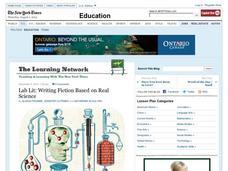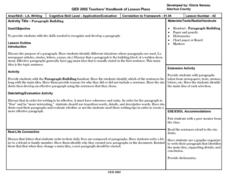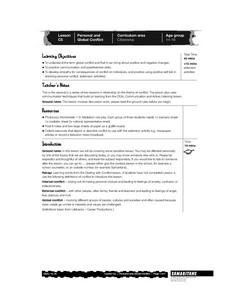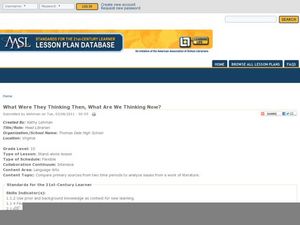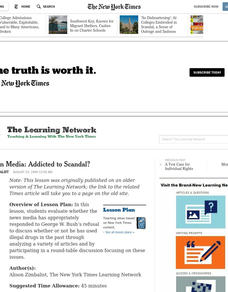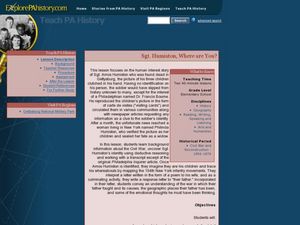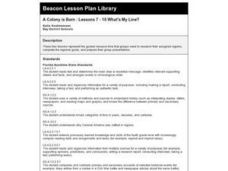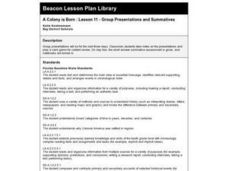Curated OER
The Waterfront Debate
Tenth graders debate a resolution about a planned waterfront community from the point of view of various interest groups. They have a "Town Meeting" in which members from each interest group debate their researched opinions for points....
The New York Times
Writing Fiction Based on Real Science - NYTimes.com
Refuse to alienate your scientific-minded young scholars during your creative writing unit. Learners explore how literary writing can reflect observable fact, and be based in actual science. The links include examples of fiction and...
Curated OER
It's Your Life - Safe or Sorry/Safety Issues
Students examine and chart data about safety hazards and unsafe situations. In this safety hazard instructional activity, students examine newspapers and web sites to investigate injuries from safety hazards. They make a spreadsheet...
University of the Desert
Fact and Opinion within the Media
How can the media foster cultural misunderstandings? These activities encourage learners to distinguish between fact and opinion in the media
NASA
Raisin Bread Universe
What is the universal breakfast? The resource includes two activities, the first one observing oatmeal to understand the texture of the universe. Then, scholars measure raisin bread dough before and after it rises to represent the...
Curated OER
Puerto Rico: The 51st State?
Students examine the political status of Puerto Rico. In this global studies lesson, students explore Puerto Rico and consider the feelings of Puerto Ricans regarding their unique political status.
Curated OER
Paragraph Building
Build the skills your budding authors need to develop to compose well-structured paragraphs. Give them the topic sheet (included here), and have them write a cohesive paragraph using the ideas listed. Consider having them include two...
Curated OER
Enhancing Poetry with American Memories
Young scholars explore poetry using American Life Histories: Manuscripts from the Federal Writers' Project. They compose their own unque "found poetry" based on the stories found in the collection.
Curated OER
Personal and Global Conflict
Students review vocabulary of conflict. In this citizenship lesson, students practice conflict resolution skills by participating in a role play involving national representatives working with a UN Mediator. Students reflect on the...
Curated OER
What Were They Thinking Then, What Are We Thinking Now?
Choosing an issue from a play or novel, researchers find two primary sources from different time periods to compare how people's views have changed. Many questions are listed to guide young writers. In the end, learners produce a...
Curated OER
A'ama and Pipipi Adaptations
Young scholars explore ocean creatures. In this crustacean lesson, students determine how Black Nerite snails and Sally Light-foot crabs have adapted to their ocean habitats. Young scholars complete diagrams and hypothesize about the...
Curated OER
Chemical Reactions with Vinegar
Fifth graders create their own volcano. In this science lesson, 5th graders build a "volcano" using vinegar and baking soda. They observe and analyze outcomes, and define a chemical reaction.
Curated OER
We The People
Students consider the main concepts of the Preamble of the United States Constitution They research different issues explored in the Constitution which have both historic and modern connections.
Curated OER
Separation of Church and Class?
Students examine the changing socioeconomic status of the evangelical Christian population in the United States. They discuss the relationship between class and religion in American society.
Curated OER
The Maccabees and Their Place in Jewish History
Students assume the role of a journalist employed by time Warner to examine data about the long-lost cave contining the tombs of Maccabees. A two page spread is created for the weekend edition of the magazine.
Curated OER
American Media: Addicted to Scandal?
Students examine media coverage of George W. Bush's refusal to answer questions regarding past illegal drug usage in the 1999 campaign. They consider the role of rumor, scandal, audience and relevance in political media coverage.
Curated OER
Striking Out At the Serbs
Students are introduced to the most recent stage of the conflict in Kosovo by allowing them to examine the positions and actions of various key figures (people, countries, and organizations).
Curated OER
Sgt. Humiston, Where are You?
Learners become familiar with the events of the Civil War. For this identification lesson, students use deductive reasoning to understand how the deceased soldier was identified. Learners view primary documents for...
Curated OER
At the Heights of Conflict
Learners examine the historic and present conflict between Israel and Syria over the Golan Heights. In groups students present the class with information on the Golan Heights. They write an essay defending his or her view on the future...
Curated OER
Cell Structure and Function
Students discuss scientific advances brought about by the Mars Surveyor Space Program which impact on daily life, identify laboratory apparatus like microscopes, slides and coverslips, and use the microscopes to view cells and organisms.
Curated OER
A Colony is Born : Lesson 4 - What Went Wrong?
Fifth graders compare and contrast two early colonies and make a T chart. They list examples of worked well and what did not, and significant historical events. They use higher order thinking skills by deducing how different scenarios...
Curated OER
A Colony is Born : Lessons 7 - 10 What's My Line?
Fifth graders research their assigned regions, complete regional guide and prepare presentations about the New World colonists. They refer to "Everyday LIfe: Colonial Times" as well as searching marked internet sites.
Curated OER
A Colony is Born : Lesson 11 - Group Presentations and Summatives
Fifth graders give presentations on colonial research. The others take notes on the presentations. They play a card game which helps them review content. They take a summative assessment and present their research notebooks.
Curated OER
A Colony is Born : Lesson 6 -To Leave or Not to Leave
Fifth graders connect reasons for coming to the New World with identity. The create identities and place them in one of three settled regions. They refer to prior study notes in their Colonial Notebooks to establish their identities.



